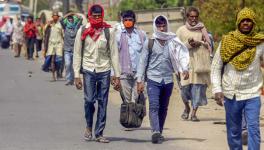Social Impact Assessment of First Phase of Proposed Bengaluru Elevated Corridor Project
Image for representational use only.Image Courtesy : Scroll
On May 14, a group of architects, lawyers, students, activists and others belonging to Bengaluru Bus Prayanikara Vedike (Forum of Bus Commuters), Citizens for Bengaluru, The Students’ Outpost, Bengaluru Suddi and others did a Social Impact Assessment of the controversial elevated corridor project of the Karnataka Government. The current Congress-Janata Dal (Secular) coalition government has proposed a series of elevated corridors aiming to solve the traffic problem in the city. Costing Rs 26,690 crore and running a length of 87.87 km, the projects involves the construction of 6 corridors: one running North-South, two running East-West and three connecting corridors.
However, the Metropolitan Planning Committee (MPC) has not approved the project. The High Court of Karnataka has also stayed the project. The activists in the city recognising the disinterest shown by the governments towards the betterment of public transport, which is the most rational solution for the existing traffic problem, are protesting the irrational urban plans of the government. Speaking to Scroll.in, Srinivas Alavilli co-founder of Citizens for Bengaluru, had rightly observed, “We have nearly 50 flyovers in the city and three elevated corridors. If these are the solutions, then they have failed because we still have traffic problems. Transport research shows that if you create more road space, it will attract more vehicles, which is a worldwide urban phenomenon.” The question that the assessment team ask is, why is the government hell bent upon this project, despite the fact that the Detailed Feasibility Report recognises the possibility of failure of the project?
One can say, this project is a classic example of a systematic movement of the governments towards privatisation. As is discussed in the assessment report, all that these corridors would do is to increase private transport while the government continues to keep the betterment of public transport the least of their priorities.
Also Read: Transport Workers’ Strike: Public Transports Keep Off Roads Across The Country
The First Assessment Report
The government had issued tenders for the first phase of the project, i.e the North South Corridor on March 2, 2019. This corridor is from Baptist Hospital to Central Silk Board junction, covering a distance of 22.12 kilometres. This phase is divided into 3 packages:
-
Package 1 – Baptist Hospital to JC Nagar (6.15km)
-
Package 2 – JC Nagar to Double Road ( 8.75km)
-
Package 3 – Shanti Nagar to Central Silk Board ( 7.22 km)
The assessment of just this phase of the project has brought out the devastating impact this project is to have on the already deteriorating environment of the city. It is observed that it would lead to massive felling of trees. During the process of construction, 3,821 trees will be cut and 2,084 trees will be trimmed. The project would also require 266 million litres of water and that, when the state is facing an acute shortage of water. It is estimated that 1,130 buildings (homes, shops, religious and educational institutions) would be affected, making the already accelerating air pollution worse by generating 5,88,678 cubic metres of debris. All of this is just in the phase I of the project.
Also Read: Bengaluru Citizens Strictly Against Proposed Bus Fare Hike
Forget about solving the city’s nightmare, this project is going to prove a nightmare in itself. Not just pollution but in all possibilities the project would lead to an increase in the number of vehicles on the streets. Apart from damaging the environment in the city, this assessment also shows that the project is not in the hands of those who are accountable.
The project is being implemented by the Karnataka Road Development Corporation Limited (KRDCL), a government company over which the Bruhat Bengaluru Mahanagara Palike (BBMP-the municipal body) or corporators have no say. The assessment report notes, “An inquiry by the Comptroller and Auditor General of India (CAG) into the functioning of KRDCL between 2008-2013 found several issues with their functioning - implementing the project design changes after awarding the contracts, wrong estimates and failure to acquire land resulted in time and cost overrun in many cases. CAG said that they completed only 86.47 km of roads as against the target of 404.67 km.” The report wonders how long the KRDCL will take to complete this complex elevated corridor project and who would hold them accountable?
The Alternative
The activists in the city have been demanding for providing more buses in the city. Bengaluru Metropolitan Transport Corporation (BMTC) serves 57 lakh commuter trips with 6,000 buses and raises its own revenue with highest bus fares in the country. However, the BMTC fleet size has not grown in the last 5 years, while 1,500 private vehicles are added every day, as argued by the activists.
Despite having the highest bus fares in the country, the Karnataka government had proposed to hike both Bengaluru Metropolitan Transport Corporation (BMTC) and Karnataka State Road Transport Corporation (KSRTC) bus ticket fares by 18% owing to the soaring fuel prices. Following the massive protests, this move had to be stalled.
On March 19, 2019, Chief Minister HD Kumaraswamy had met Leo Saldanha of Environment Support Group, Prof Ashish Verma of Indian Institute of Science, Prakash Belawadi, Naresh Narasimhan, Vinay Sreenivasa of Bengaluru Bus Prayaneekara Vedike (BBPV), Zibi Jamal of Whitefield Rising, Isaac Amritaraj of Slum Janaandolana Sanghatane, and Srinivas Alavilli and Tara Krishnaswamy of Citizens for Bengaluru (CfB). The CM had agreed to hold wide ranging and open public consultations on the issue of mobility itself, including the proposed elevated corridor project before proceeding any further in the matter.
However, it is becoming increasingly obvious that the government is all set to invest in a project of whose outcome it is not even certain of and is not paying heed to the proposals for other feasible options.
Get the latest reports & analysis with people's perspective on Protests, movements & deep analytical videos, discussions of the current affairs in your Telegram app. Subscribe to NewsClick's Telegram channel & get Real-Time updates on stories, as they get published on our website.
























